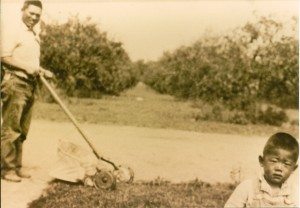In 1914, Kajiro Oyama moved from Japan to California. He wanted to own land but was unable to because of the Alien Land Law. In 1934, Kajiro bought a parcel of land titled to his son, Fred, and bought another in 1937 under his son’s name. Fred had birthright citizenship allowing him to assume ownership of the property, and since Fred was a minor, Kajiro was appointed his official guardian. During World War II, the Oyama family was forced to evacuate to Utah. While they were away, a petition was filed stating that the two parcels of land acquired in the 1930s were made in order to evade the Alien Land Law and should be escheated to the state. After returning to California, the Oyamas chose to challenge the Alien Land Law.

The Oyamas, ACLU San Diego
